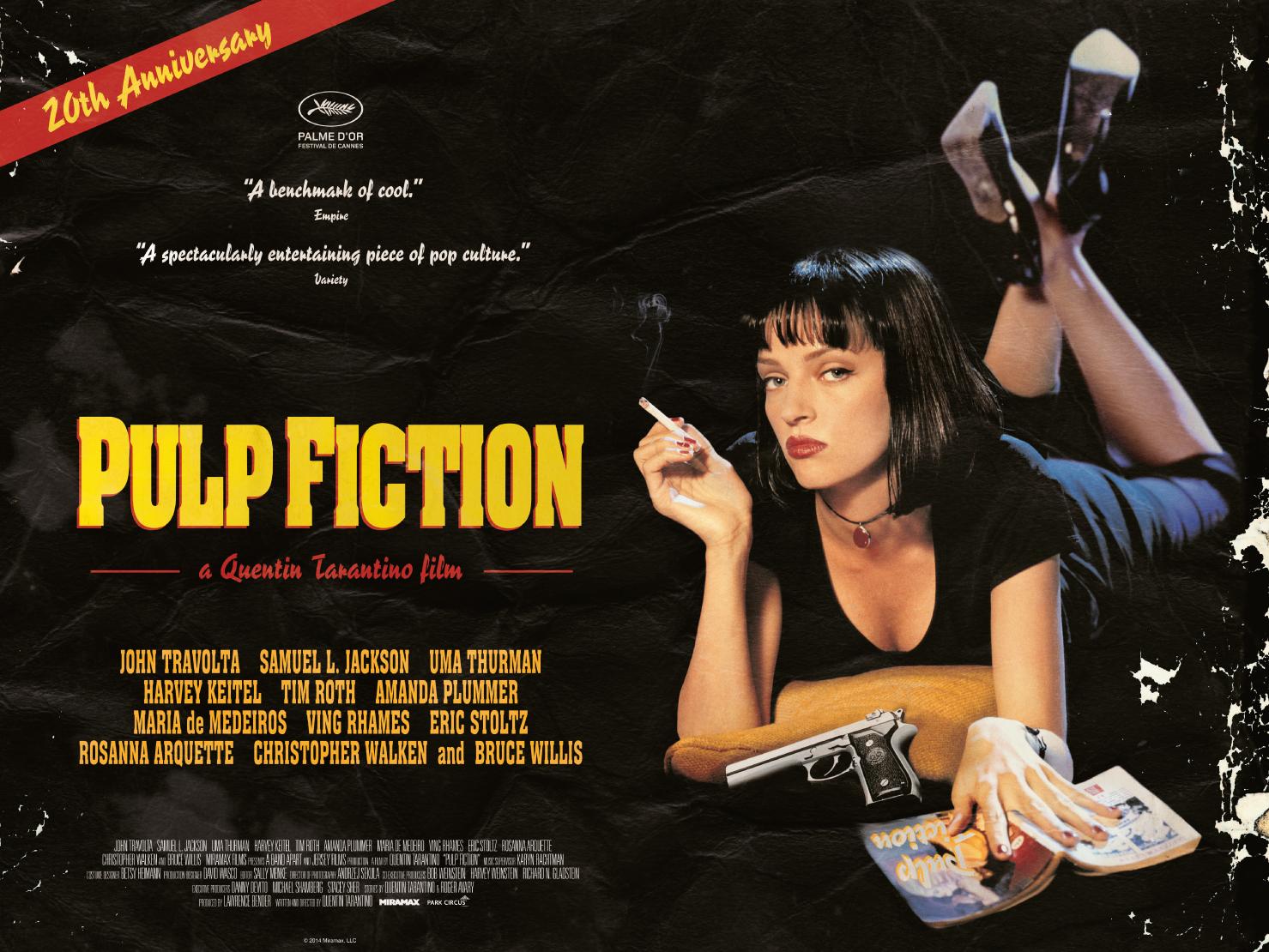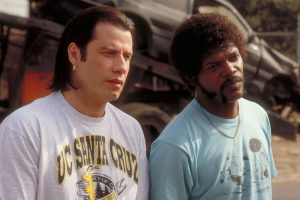Pulp fiction (1994)

ulp Fiction (1994), directed by Quentin Tarantino and written by Tarantino and Roger Avary, is a landmark film in independent cinema and a defining work of the 1990s. Known for its innovative storytelling, memorable dialogue, and eclectic soundtrack, it has had a profound impact on the film industry. Here’s a review of this influential and highly acclaimed movie:
Plot and Structure
Pulp Fiction is renowned for its non-linear narrative structure. The film interweaves several stories that revolve around the Los Angeles criminal underworld, presenting them out of chronological order. The intertwining plots include:
- Vincent Vega and Mia Wallace: Vincent Vega (John Travolta), a hitman, and Mia Wallace (Uma Thurman), the wife of his boss, go out on a date. Their evening takes a dramatic turn, leading to a series of unexpected events.
- The Gold Watch: This storyline follows Butch Coolidge (Bruce Willis), a boxer who double-crosses a crime boss and attempts to escape with his girlfriend. The plot revolves around his struggle to retrieve a valuable family heirloom.
- The Bonnie Situation: Vincent and his partner, Jules Winnfield (Samuel L. Jackson), get caught up in a chaotic situation involving a car accident and a dead body, which leads to an unusual resolution.
- The Diner: The film’s bookending story involves a diner robbery by a couple, Pumpkin (Tim Roth) and Honey Bunny (Amanda Plummer), and the intervention of Jules and Vincent. This sequence ties together the various narrative threads.

Performances
- John Travolta delivers a career-defining performance as Vincent Vega. His portrayal combines charisma, humor, and a laid-back attitude, making Vincent one of the film’s most memorable characters.
- Samuel L. Jackson shines as Jules Winnfield, bringing intensity, gravitas, and a philosophical edge to his role. His performance, particularly his delivery of the “Ezekiel 25:17” monologue, is iconic.
- Uma Thurman’s portrayal of Mia Wallace is captivating, combining charm, wit, and an enigmatic quality. Her performance, especially in the dance scene at Jack Rabbit Slim’s, has become legendary.
- Bruce Willis and Ving Rhames also deliver strong performances, contributing to the film’s rich tapestry of characters.

Direction and Writing
Quentin Tarantino’s direction is bold and inventive, marked by his signature style of sharp dialogue, dark humor, and eclectic references. The non-linear narrative structure is a key element of the film, creating a complex and engaging storytelling experience. Tarantino’s writing, characterized by witty and memorable dialogue, provides depth and personality to the characters and their interactions.
Cinematography and Score
- Roger Avary and Tarantino’s screenplay is both original and influential, with a structure and dialogue that have left a lasting impact on filmmaking.
- Robert Richardson’s cinematography is stylish and vibrant, using bold colors and dynamic compositions to enhance the film’s unique tone and atmosphere.
- The soundtrack, curated by Tarantino, features an eclectic mix of rock and soul music that complements the film’s tone and enhances its retro feel. Songs like “Misirlou” by Dick Dale and “You Never Can Tell” by Chuck Berry are integral to the film’s identity.

Themes and Impact
Pulp Fiction explores themes of fate, redemption, and the randomness of life. The film’s exploration of moral ambiguity and the interconnectedness of its characters invites viewers to reflect on the nature of choice and consequence.
The film’s impact on cinema is profound. It revitalized the career of John Travolta, established Quentin Tarantino as a major filmmaker, and influenced a generation of filmmakers with its innovative storytelling and style. Its dialogue, characters, and narrative structure have become iconic in popular culture.
Reception
Pulp Fiction was a critical and commercial success, winning the Palme d’Or at the Cannes Film Festival and earning seven Academy Award nominations, including Best Picture, Best Director, and Best Screenplay. It won the Academy Award for Best Original Screenplay, and its influence continues to be felt in both independent and mainstream cinema.
In summary, Pulp Fiction is a groundbreaking film that combines inventive storytelling, sharp dialogue, and memorable performances to create a lasting cultural impact. Its unique structure, engaging narrative, and stylistic elements make it a defining work of 1990s cinema and a classic of the genre.











